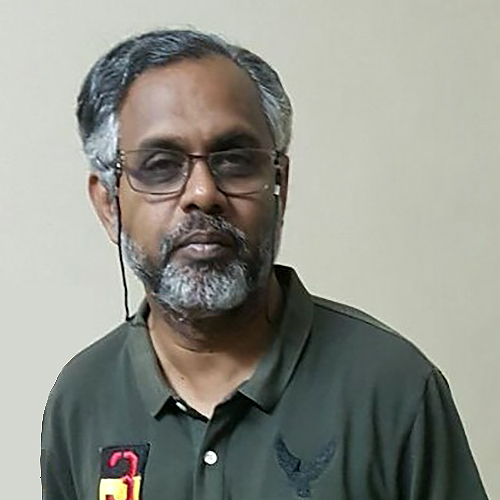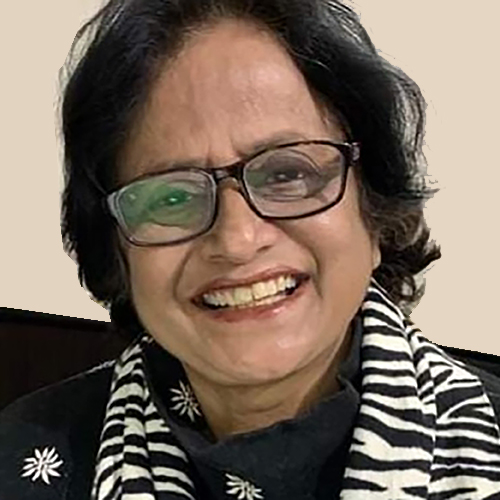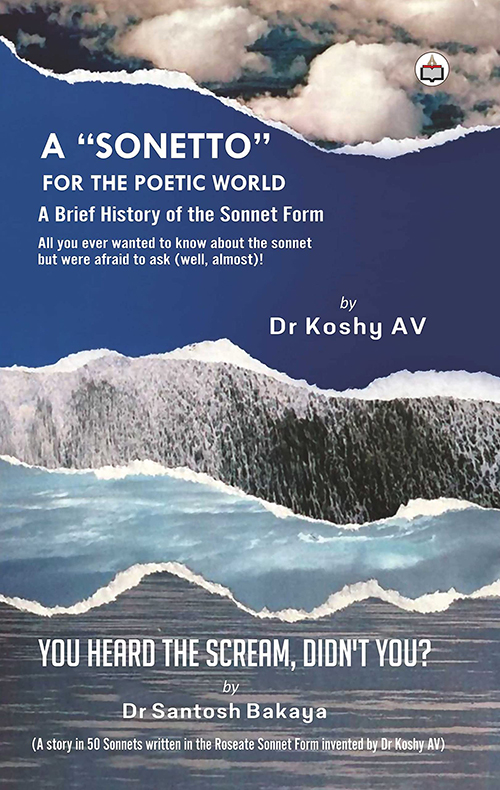‘A “Sonetto” for the Poetic World‘
★ ★ ★ ★
POETRY BOOK REVIEW

Image by Emmanuel Phaeton
A “Sonetto” for the Poetic World: A brief history of the Sonnet form by Koshy AV (Authorspress, 2022)
Review by Feby Joseph
A solid structure ensures the overall integrity of any piece of art, be it the carefully drawn blueprint that forms the skeleton of a cathedral or, in music, the sonata form, which constitutes the backbone of a solid symphony. The sonnet in literature could lay claim to such a status considering the centuries of budding and development that resulted in this unique form of poetic expression, so it’s more than understandable a 21st century novice would look at this form with equal parts admiration, fear, and scepticism. Is the sonnet more than just a curious study of poetic history; has it evolved; is it even relevant today?
The answers to all these questions (and some more) lie in this beautiful volume of 21 chapters. Dr. Ampat Koshy, an authority on the works of Samuel Beckett, has charted the early Petrarchan evolution of the sonnet form and takes us through its different stages of evolution, from Shakespeare, The Elizabethan Sonnets, Milton, Keats, Shelly, and the Victorian Sonnet all the way through Modernist movements, detouring through Rilke in Germany, Michael Madhusudhan Dutt in India, and, arguably my favourite chapter, Pushkin & Vikram Seth. Each chapter is generously augmented with stylistic examples. The book (or rather Dr. Koshy’s part in it) concludes with a nod to contemporary sonneteers and the possible (future) evolution of the form; to this end Dr. Koshy cites his own invention, the Roseate Sonnet, a form that found enough success to produce an independent volume entitled The Roseate Sonnet Anthology in 2020.
Albeit a technical book, which in theory could be rather dry and academic, Dr. Koshy presents his masterful analysis with such love and care that the reader finds himself or herself floating from one chapter to the next. By the end of this book, I came out with a desire to experiment with the sonnet form (and have attempted a happy few, so far!); this, in my opinion, is this book’s greatest strength. While most technical books often appear to be written for the edification of literary critics, more often than not in a language guaranteed to give the average reader brain haemorrhage, Sonneto escapes this pitfall by giving the reader everything he or she ever wanted to know about the sonnet and leaving the reader thirsty enough to ensure they go on their own Sonetto-journey. This book would be a wonderful addition to any college or school library.
The second part of this book comprises a single poem – a Magnum Sonnet in “Roseate Sonnet” form comprising of 50 parts and written in the tradition of Pushkin and Vikram Seth. This massive sonnet narrating a tale of Dickensian tragedy is penned by the prolific Dr Santosh Bakaya, who has authored over 23 books, including “Oh, Hark!” which can best be described as a fantastic flight of fancy. As with any fictional work, I will refrain from discussing it in detail; rather, I invite the reader to read and be amazed!

Dr. Koshy AV is an Assistant Professor at Mount Carmel College Autonomous, Department of English, Bangalore, Karnataka, India. He is well known in some circles as a poet, fiction writer, editor, anthology maker, critic, and theoretician or essayist. He has 25 books with his name on the cover to his credit and many degrees, certificates, awards, and nominations.

Winner of the International Reuel Prize for poetry (2014) Santosh Bakaya, PhD, is a poet, novelist, biographer, TEDx speaker, internationally acclaimed for her poetic biography of Mahatma Gandhi Ballad of Bapu. Her twenty three books cutting across different genres, have been well-received. What is the Metre of the Dictionary? is her latest book of poetry.

Hailing from state of Kerala, Feby Joseph describes himself as a spiritual vagabond, currently working as a Piano teacher in Mumbai. Feby is the winner of Reuel International Prize for Poetry, 2020. Some of his works have appeared on Café Dissensus, Foreign Literary Journal and The Bangalore Review.

























dd91ti
llmom4
veas6h